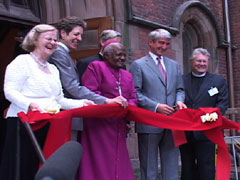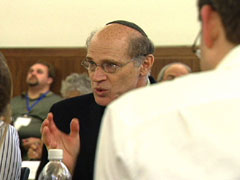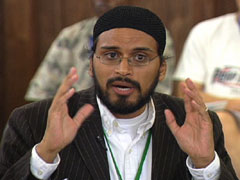In This Episode << SLIDE LEFT TO SEE ADDITIONAL SEGMENTS
Scriptural Reasoning
TIM O’BRIEN, guest anchor: Because of fundamental religious differences, people of different faiths have often had problems talking to each other about their beliefs. Some theologians are now trying a new approach. It’s called scriptural reasoning. Bob Abernethy reports.
BOB ABERNETHY: At New York’s General Theological Seminary, a celebration opening a new center for peace and reconciliation named for South Africa’s Anglican Archbishop Desmond Tutu.
DESMOND TUTU (cutting ribbon): I declare the Desmond Tutu Education Center open.
ABERNETHY: But in the wider world, with many Muslims, Christians, and Jews fearing violence from each other, reconciliation between different religions can seem remote.
David Ford is a professor of theology at Cambridge University in England.
Dr. DAVID FORD (Professor of Divinity, University of Cambridge, England): The divisions at present in our world, between Christians and Muslims especially, are so acute and so dangerous for the future of our whole world we have to take risks, it seems to me, to engage across the boundaries.
ABERNETHY: Rumee Ahmed is the Muslim chaplain at Brown University.
RUMEE AHMED (Muslim Chaplain, Office of the Chaplains and Religious Life, Brown University): When we’re talking about relations between people of difference, you really only have a few alternatives. You can destroy them. You can make them all like yourself. Or you can engage them and try to understand them.
ABERNETHY: Ever since 9/11, all over the U.S. Christians and Jews have tried to better understand Muslims, searching for common ground in spite of theological differences. But some scholars now favor a kind of interfaith dialogue that emphasizes neither common ground nor differences, but the study of each other’s sacred texts. They call it scriptural reasoning.
Dr. FORD (at workshop): It is not about consensus.
ABERNETHY: At the Tutu Center opening, David Ford helped lead a workshop on scriptural reasoning, which he said creates a spirit that transcends theological differences.
FORD: We try to engage in such a way that there is understanding across those differences and trust across those differences. One of our phrases is “not consensus but friendship.”
ABERNETHY: Peter Ochs of the University of Virginia was another leader of the workshop.
Dr. PETER OCHS (Professor of Modern Judaic Studies, University of Virginia): There’s a table. There’s a collection of readers from different traditions. There’s very small selections from each of the scriptures, and they interrupt and they challenge each other. The Muslim, the Jew, and the Christian look at each other and they learn after a couple of days, “My goodness, you too love God. I can trust you.”
ABERNETHY: All the scripture chosen for this workshop was about poverty and the obligation to help the poor and oppressed.
Dr. OCHS: Look at text 24 through 27: “If you lend money to any of my people, even to the poor with thee, thou shalt not be to him as a creditor. Neither shall you lay upon him interest.” You mean charging interest is an example of oppression?
ABERNETHY: The Muslim discussion began with a recitation from the Qu’ran.
Mr. AHMED: The beginning is setting up the person who gives properly, the mindset of that person, and then after that the person who you are supposed to give it to, and then finally the right way that they’re supposed to give it.
ABERNETHY: Then, again, debate about the prohibition against charging interest on a loan.
Dr. OCHS (to Mr. Ahmed, in workshop debate): You can’t even give out a loan to a person who just wants to expand her farm?
Mr. AHMED (to Dr. Ochs, in workshop debate): Well, no, you can.
Dr. OCHS: Yeah?
Mr. AHMED: But you can’t have that loan based on usury.
Dr. OCHS: Usury meaning what? Usury meaning oppressive interest or just interest?
Mr. AHMED: That’s a good question.
Dr. OCHS: What’s your answer?
Mr. AHMED: Well, I honestly can’t say.
ABERNETHY: In this group, the relations were congenial. But what would they say to someone who insists only his or her religion is true?
Dr. OCHS: We would say, “Great. Therefore you respect revelation, right? What do you consider these other two here who also receive revelation?” If the individual simply says, “They’re infidels, let me at them,” we say, “I’m sorry, we don’t want you studying.” If there is someone who says, “I respect their tradition. If I sit and talk to them I’ll convert them,” we say, “Come on in,” because that’s what we want. We want individuals who believe they have the answers, who respect discussion, and we trust that the texts can take care of themselves.
ABERNETHY: And do they?
Dr. OCHS: They do.
ABERNETHY: Ochs and others have high hopes for scriptural reasoning. They’re trying to spread it to 1,000 cities. They also think it can encourage reconciliation.
Dr. FORD: I think politicians in particular have just woken up to the fact that the religions are powerful. They shape perceptions. I think that unless we deeply understand the core identities of each of the traditions, and scriptures are essential to that, then you do not have the right starting point for engaging with religion in the public sphere.
Mr. AHMED: Scriptural reasoning says to Muslims, Jews, and Christians: We believe, and our belief is important, and we’re not the same. What Muslims need to see, and what the West needs to see also, are the vast numbers of people who are committed to reconciliation and who are committed to their texts, so they can see, well, there’s a Christian here who really cares about me and cares about my text and isn’t trying to convert me but just wants to understand me.




